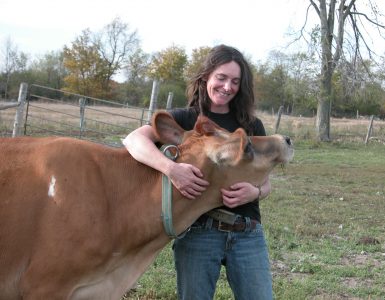Raising chickens is a most enjoyable way to lose your romanticism about farming.
Don’t get me wrong. I love looking out the window to see a flock of chickens pecking happily in the pasture. Like the crowing of a rooster at dawn, it’s one of the classic symbols of the farm. A flock of chickens is emblematic of the “simple life,” the supposedly idyllic pastimes of country living. I’ve been glad to see the growing popularity of urban chickens and backyards hens in recent years. I think it’s good for people, and especially kids, to have that connection to living creatures, to be able to watch them and feed them and get fresh eggs. It brings some of the benefits of farming
into the city; and, just as importantly, it debunks some of the myths.
The first problem for the idealist? Manure.
Much of the romanticism goes out the window when it’s time to clean the hen house. Consider our (somewhat unusual) arrangement for chicken housing. Our coop is built on the chassis of an old wagon, so we move it around from place to place throughout the year to give the chickens fresh grass, or access to a greenhouse, or to empty out the bedding at the compost pile.
We use deep bedding in our chicken house and add wood shavings regularly over the winter. Chickens love to scratch, so they mix the new bedding in with their manure to yield a dry and comfortable surface.
Recently it was time to clean the hen house, so my partner Emily and I spent an hour kneeling and squatting in the lowroofed coop, shoveling out a winter’s accumulation of chicken manure and wood shavings. Chicken manure with deep bedding doesn’t smell too bad; it’s very dry. But experience is dusty and makes you head for the shower immediately.
The second problem is this: the miracle of life is always accompanied, eventually, by its opposite. “If you’ve got livestock, you’ve got deadstock,” goes an old farmers’ saying. Chickens, especially older chickens, die. Sometimes they pass from natural causes. But any number of predators-raccoons, foxes, coyotes-are happy to speed the process along.
A few years ago we had nearly 100 hens. (Currently we have a more manageable flock of two dozen, a minor project compared to our farm’s dairy herd and vegetable gardens.) A hundred chickens will make quite a ruckus in the mornings, so it seemed strange when one morning when I found the chicken house quiet when I arrived for chores. I opened the door to a scene of carnage. Overnight a raccoon had peeled back some metal roofing to wriggle inside to kill a third of the chickens (mostly by decapitation). The survivors stared at me from the gore, uncharacteristically silent.
That level of violence is uncommon. But mortality is universal.
A third and final problem for the romantic is one of ethics. Chickens do not adhere to anything we humans would recognize as an ethical system. Chicken morality, if it exists, is capricious.
The “pecking order” is real, and chickens at the top sometimes peck “lower” chickens on their tender, fleshy combs. The dominant chickens will sometimes do this when oppressed chickens are trying to eat from a feeder. The dominant chickens do it even though they have more food than they could possibly eat.
I suppose we shouldn’t get too cocky about our moral superiority, since any viewing of the evening news will showcase worse behaviour by humans.
None of which is to say chickens are stupid, or that they don’t have feelings. They clearly do have feelings. They get afraid, and occasionally they get angry or competitive with one another, or lonely if separated from the group. But they also get excited when people come over, and they are curious to explore new objects or surroundings. They laze languorously in the sun on the warm days of early summer, flopping out in the grass with their wings out, making me think they’re dead.
These realities of farming don’t make it less enjoyable. Well, sometimes they do, but they also enrich the experience. A clean chicken house is more pleasing because of the work it requires. Chickens die, but the constant flow of eggs means that a new batch of chicks is never more than an incubator-month away. And yes, some chickens are bullies; but that doesn’t stop the other chickens from enjoying a beautiful summer day.
Aric McBay is a farmer and author. He lives and works at a mixed family farm with a dairy herd and a vegetable operation.







